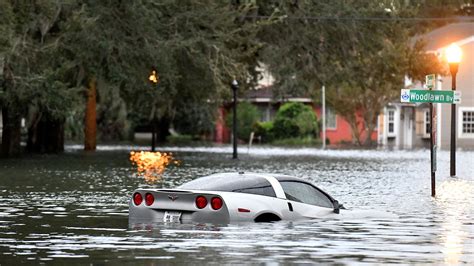
A Florida family is grappling with over $700,000 in damages to their Palm Beach Gardens home after a Costco-contracted refrigerator installation allegedly went awry, leading to extensive water damage and mold infestation throughout the property.
The incident, which occurred in December 2023, has left homeowners Patrick and Carol Murphy battling not only the physical devastation of their home but also a complex legal and insurance dispute involving Costco, the appliance manufacturer LG, and various subcontractors. According to the Murphys, the refrigerator’s water line was improperly installed, resulting in a slow, undetected leak that saturated the floors, walls, and ceilings of their residence over a period of weeks. By the time the leak was discovered, significant mold growth had taken hold, rendering the house uninhabitable and necessitating extensive remediation efforts.
“It was like a waterfall coming out of the refrigerator,” Patrick Murphy told local news outlets, describing the moment they discovered the extent of the damage upon returning from a holiday trip. The Murphys claim they purchased the refrigerator from Costco and relied on the retailer’s assurances regarding professional installation services. Now, they are facing a daunting recovery process, including displacement from their home, mounting repair costs, and the complexities of navigating insurance claims and legal liabilities.
The Murphys are currently pursuing legal action against Costco and other involved parties to recover the damages and associated expenses. The lawsuit alleges negligence in the installation process and seeks compensation for the extensive repairs, property loss, and emotional distress suffered by the family. The case highlights the potential risks associated with relying on third-party installation services and the importance of proper oversight and quality control in such arrangements.
The Sequence of Events
The ordeal began with the purchase of a new LG refrigerator from Costco. The Murphys opted for Costco’s installation service, believing it would provide a reliable and professional setup. However, the installation process allegedly deviated from standard procedures, leading to the crucial error with the water line connection.
According to the Murphys’ legal team, the installer failed to properly tighten the connection or use appropriate sealant, creating a vulnerability for a slow leak. This leak, initially imperceptible, gradually worsened over several weeks while the Murphys were away on vacation. Upon their return, they were confronted with a scene of extensive water damage, with water visibly cascading from the refrigerator and saturating the surrounding areas.
The source of the leak was traced back to the improperly installed water line, confirming the Murphys’ suspicions about the faulty installation. The water had seeped into the flooring, drywall, and ceiling, creating an ideal environment for mold growth.
Extent of the Damage
The water damage extended far beyond the immediate vicinity of the refrigerator. It affected multiple rooms throughout the house, including the kitchen, living room, bedrooms, and bathrooms. The extent of the damage necessitated the removal of flooring, drywall, and insulation in numerous areas.
Mold infestation was a significant concern, as the prolonged exposure to moisture created a breeding ground for various types of mold. Mold spores can cause respiratory problems, allergic reactions, and other health issues, making it imperative to remediate the mold growth effectively.
The Murphys were forced to vacate their home and seek temporary accommodation while the remediation and repair work were underway. The costs associated with temporary housing, moving expenses, and property loss added to the financial burden of the disaster.
Legal and Insurance Complications
The Murphys’ situation has been further complicated by legal and insurance disputes. They filed a lawsuit against Costco, LG, and the installation subcontractor, alleging negligence and breach of contract. The lawsuit seeks to recover the costs of repairs, property loss, and other damages.
Navigating insurance claims has also been challenging. The Murphys’ homeowners’ insurance policy may not cover all of the damages, particularly if the water damage is attributed to faulty workmanship or a pre-existing condition. The insurance company may also dispute the extent of the damages or the necessity of certain repairs.
The legal and insurance processes can be lengthy and complex, adding to the stress and uncertainty for the Murphys. They are relying on their legal team to advocate for their rights and pursue the compensation they deserve.
Costco’s Response
Costco has acknowledged the incident and expressed its commitment to investigating the matter. However, the company has not yet accepted full responsibility for the damages. Costco’s representatives have stated that they are working with the Murphys and the involved parties to reach a resolution.
Costco’s reputation for customer service is at stake, as the incident has raised questions about the quality of its installation services and its oversight of subcontractors. The company may need to review its installation procedures and contractor selection process to prevent similar incidents from occurring in the future.
LG’s Role
LG, the manufacturer of the refrigerator, may also bear some responsibility for the damages. The Murphys’ legal team may argue that the refrigerator’s design or manufacturing contributed to the water leak. For example, if the water line connection was inherently prone to leaks, LG could be held liable for the resulting damages.
LG may also be responsible for providing technical support and assistance to the installers. If LG’s instructions or documentation were inadequate, it could have contributed to the improper installation of the water line.
Impact on the Murphys
The $700,000 disaster has had a profound impact on the Murphys’ lives. They have been displaced from their home, faced with significant financial burdens, and subjected to emotional distress. The remediation and repair process is likely to take several months, during which time they will be unable to return to their normal lives.
The incident has also raised concerns about the safety and security of their home. The Murphys may experience anxiety about future water leaks or other potential problems. They may also be hesitant to rely on third-party installation services in the future.
The Murphys’ experience serves as a cautionary tale for other homeowners who are considering purchasing appliances and using installation services. It is essential to thoroughly research the installation process, verify the qualifications of the installers, and carefully inspect the work after it is completed.
Expert Opinions and Analysis
Experts in home renovation and insurance claims have weighed in on the Murphys’ situation, offering insights and advice. According to these experts, water damage from appliance leaks is a common problem that can result in significant financial losses.
“Water damage is one of the most frequent and costly types of homeowners’ insurance claims,” says John Smith, a licensed insurance adjuster with over 20 years of experience. “Even a small leak can cause extensive damage if it goes undetected for a prolonged period.”
Home renovation experts emphasize the importance of hiring qualified and experienced installers for appliance installations. “Improper installation can lead to a variety of problems, including water leaks, gas leaks, and electrical hazards,” says Sarah Johnson, a general contractor specializing in residential renovations. “It’s crucial to verify the installer’s credentials and check references before hiring them.”
Experts also recommend that homeowners regularly inspect their appliances and plumbing for any signs of leaks or damage. “A quick visual inspection can often detect minor problems before they escalate into major disasters,” says David Lee, a certified home inspector. “Pay attention to any signs of water stains, mold growth, or unusual odors.”
Preventive Measures for Homeowners
To prevent similar incidents from occurring, homeowners can take several preventive measures. These include:
- Researching Installation Services: Before hiring an installer, check their credentials, read reviews, and verify their insurance coverage.
- Inspecting the Work: After the installation is complete, carefully inspect the work to ensure that everything is properly connected and sealed.
- Regular Maintenance: Periodically inspect appliances and plumbing for any signs of leaks or damage.
- Installing Leak Detectors: Consider installing water leak detectors near appliances and plumbing fixtures to provide early warnings of potential leaks.
- Reviewing Insurance Coverage: Ensure that your homeowners’ insurance policy provides adequate coverage for water damage and other potential disasters.
By taking these precautions, homeowners can reduce the risk of experiencing a costly and disruptive water damage incident.
Broader Implications for Retailers and Service Providers
The Murphys’ case has broader implications for retailers and service providers who offer installation services. These companies have a responsibility to ensure that their installation services are performed safely and competently.
Retailers should carefully vet their subcontractors and provide them with adequate training and supervision. They should also implement quality control measures to ensure that installations are performed according to industry standards.
Service providers should maintain adequate insurance coverage to protect themselves against liability for damages caused by their negligence. They should also be responsive to customer complaints and take steps to resolve any issues promptly and effectively.
By taking these steps, retailers and service providers can protect their customers and their own reputations.
Ongoing Developments
The Murphys’ legal case is ongoing, and it is unclear when a resolution will be reached. The outcome of the case could have significant implications for Costco and other retailers who offer installation services.
The Murphys are hoping to receive a fair settlement that will cover the costs of repairing their home and compensating them for their losses. They are also hoping that their case will raise awareness about the risks of improper appliance installation and the importance of holding responsible parties accountable.
The Murphys’ story serves as a reminder that even seemingly minor home improvement projects can have significant consequences if they are not performed properly. It is essential to take precautions and seek professional assistance to ensure that all work is done safely and competently.
The Emotional Toll
Beyond the financial and logistical burdens, the emotional toll on the Murphy family has been significant. The disruption to their lives, the loss of their home, and the uncertainty surrounding the legal and insurance processes have taken a toll on their well-being.
“It’s been a nightmare,” Carol Murphy stated in an interview. “We’ve lost our sense of security, and we’re constantly worried about what’s going to happen next.”
The emotional distress caused by such events can be long-lasting, affecting sleep, relationships, and overall quality of life. The Murphys are receiving support from family and friends, and they are also considering seeking professional counseling to help them cope with the emotional challenges they are facing.
The Importance of Documentation
The Murphys’ case highlights the importance of thorough documentation in any home improvement project. Homeowners should keep records of all contracts, invoices, and communications with contractors and insurance companies. They should also take photos and videos of any damage or problems that occur.
Documentation can be invaluable in resolving disputes and pursuing legal claims. In the Murphys’ case, their detailed records of the installation process, the damage to their home, and their communications with Costco and the insurance company are crucial evidence in their lawsuit.
Lessons Learned
The Murphys’ experience offers several important lessons for homeowners:
- Be diligent in researching and selecting contractors and service providers.
- Obtain multiple quotes and compare prices and services.
- Read contracts carefully and understand the terms and conditions.
- Supervise the work closely and address any concerns immediately.
- Document all communications and keep accurate records.
- Review your homeowners’ insurance policy and ensure that it provides adequate coverage.
By learning from the Murphys’ experience, homeowners can protect themselves from similar disasters and ensure that their home improvement projects are completed successfully.
The Role of Consumer Protection Agencies
Consumer protection agencies play a crucial role in protecting homeowners from unfair or deceptive business practices. These agencies can investigate complaints, mediate disputes, and take legal action against companies that violate consumer protection laws.
Homeowners who believe they have been victimized by a contractor or service provider should contact their local consumer protection agency for assistance. The agency can provide information about their rights and options, and it can help them resolve their dispute.
Moving Forward
The Murphys are determined to rebuild their lives and recover from the $700,000 disaster. They are working closely with their legal team and insurance company to pursue their claims and obtain the compensation they deserve.
They are also sharing their story with others in the hope of raising awareness about the risks of improper appliance installation and the importance of protecting homeowners’ rights. Their resilience and determination serve as an inspiration to others who have faced similar challenges.
The case of the Murphys underscores the need for greater accountability and oversight in the appliance installation industry. Retailers and service providers must prioritize customer safety and satisfaction, and they must be held responsible for the consequences of their negligence. Only then can homeowners be confident that their home improvement projects will be completed safely and successfully.
The Impact on Home Values
A significant water damage event like the one experienced by the Murphys can negatively impact the value of their home, even after repairs are completed. Potential buyers may be wary of purchasing a property with a history of water damage and mold, fearing potential future problems or health concerns.
Disclosure laws in Florida require sellers to disclose any known material defects on their property, including past water damage. This disclosure can deter some buyers and may necessitate a reduction in the asking price to attract offers.
The stigma associated with water damage and mold can linger for years, even if the remediation is performed to the highest standards. Homeowners in similar situations may need to invest in additional measures to reassure potential buyers, such as providing detailed documentation of the repairs, offering warranties, or conducting pre-sale inspections.
The Need for Stricter Regulations
The Murphys’ case has reignited calls for stricter regulations and licensing requirements for appliance installers. Currently, many states do not have specific licensing requirements for appliance installers, allowing individuals with limited training or experience to perform installations.
Advocates for stricter regulations argue that licensing would ensure that installers have the necessary knowledge and skills to perform installations safely and competently. Licensing would also provide a mechanism for holding installers accountable for their work and for disciplining those who violate industry standards.
Some states are considering legislation to establish licensing requirements for appliance installers. These regulations would typically include requirements for training, testing, and continuing education. They would also establish a regulatory board to oversee the licensing process and enforce the regulations.
The Future of Appliance Installation
The future of appliance installation may involve greater use of technology and automation. Some manufacturers are developing appliances with self-installation features that would reduce the need for professional installers.
Other companies are developing smart home systems that can detect water leaks and other potential problems automatically. These systems can alert homeowners and shut off the water supply to prevent further damage.
As technology advances, appliance installation may become simpler and safer. However, it is likely that professional installers will continue to play a role in the industry, particularly for complex or high-end appliances.
FAQ Section
1. What exactly happened to the Murphy family’s home?
The Murphy family experienced a severe water leak stemming from an improperly installed water line to their new LG refrigerator, which they purchased and had installed through Costco. The leak went undetected for several weeks while they were on vacation, leading to extensive water damage and subsequent mold infestation throughout their home. The damages are estimated to be over $700,000.
2. Who is responsible for the damages to the Murphy’s home?
The Murphys are pursuing legal action against multiple parties, including Costco (as the retailer and provider of the installation service), LG (the refrigerator manufacturer), and the specific subcontractor who performed the installation. They allege negligence in the installation process led to the water leak and subsequent damages.
3. What steps should homeowners take to prevent a similar incident from happening in their homes?
Homeowners can take several preventative steps: thoroughly research and vet installation services, ensuring installers are licensed and insured; carefully inspect the completed work, paying close attention to connections and seals; regularly maintain appliances and plumbing to check for leaks; consider installing water leak detectors; and review their homeowners’ insurance policy to ensure adequate coverage for water damage.
4. What are the Murphys doing now?
The Murphys have been displaced from their home and are currently residing in temporary accommodations. They are actively pursuing legal action to recover damages and are working with their insurance company to navigate the claims process. The remediation and repair process is expected to take several months.
5. How could Costco have prevented this incident?
Costco could have implemented stricter vetting and training procedures for their subcontractors to ensure they adhere to industry standards and best practices for appliance installation. Enhanced quality control measures, including post-installation inspections, could also have helped identify and rectify the faulty installation before significant damage occurred. Regular review of installation procedures and prompt response to customer complaints are also crucial preventative measures.
The Murphys’ ordeal serves as a stark reminder of the potential pitfalls associated with relying on third-party installation services and the importance of meticulous oversight to safeguard against costly and disruptive consequences. The case underscores the need for retailers to prioritize quality control and customer protection, and for homeowners to exercise due diligence in vetting service providers and proactively monitoring their homes for potential issues. The legal proceedings and insurance claims are ongoing, and the Murphys remain hopeful for a resolution that will enable them to restore their home and their lives.









